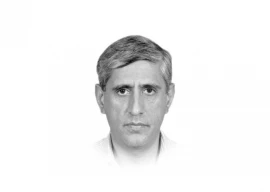
Meanwhile, the SHC also nullified the two legal amendments made to the government’s Rules of Business and the law regarding the appointment and delegation of executive power to the advisers.
The court also nullified his appointment as chairperson of the board of governors of the law colleges in Karachi and his appointment as pro vice-chancellor of the Shaheed Zulfiqar Ali Bhutto University of Law (SZABUL).
A two-judge bench, headed by the Chief Justice Sajjad Ali Shah that also comprised Justice Zulfiqar Ahmed Khan, pronounced its verdict, which they had earlier reserved on October 25 this year, after conducting lengthy proceedings.
Fareed Ahmed Dayo, a practising lawyer, had filed the case, pleading the court to declare that the appointment of Siddiqui as CM’s adviser with grant of portfolio of law, enquiries and anti-corruption establishment in addition to his appointment as chairperson of the board of governors for law colleges in Karachi as pro vice-chancellor of SZABUL were illegal.
The petitioner had argued that, as per the Constitution, the president on the advice of the prime minister, can appoint more than five advisers. Such advisers have the right to speak and otherwise take part in the proceedings of either house or a joint sitting, but are not entitled to vote.
Likewise, the CM is empowered to appoint not more than five advisers, but such advisers have no right to speak or take part in the proceedings of the provincial assembly.
He said granting portfolio of law, enquiries and anti-corruption establishment departments with status of provincial minister to Siddiqui amounted to exercise of executive authority by an adviser, who is not a chosen representative of the people.
“This act is against the mandate given to the CM and is in violation of the scheme of the Constitution, which requires the exercise of executive authority through chosen representative of the people only, claimed Dayo.
Advocate Makhdoom Ali Khan, who represented Sindh CM Murad Ali Shah, drew the judges’ attention to the fundamental principle laid down in a case by the Lahore High Court, where the court held that in cases where the state is in violation of any provision of the Constitution, every citizen is aggrieved and can competently bring a constitutional petition.
He relied upon various articles of the Constitution and provisions of the Sindh Advisers (Appointment, Powers, Functions, Salaries, Allowances and Privileges) Act, 2013, and the Sindh government’s Rules of Business of 1986 and argued that neither the Constitution, nor the 2003 Act or the Rules of Business prescribe any qualification or criteria for the appointment of the advisers. Therefore, the CM has absolute, unhindered and unchallengeable authority to appoint any person as his adviser.
Advocate Khan contended that the power of the CM to appoint an advisor is not hindered by prescribed criteria or qualifications, therefore, “he (for example) in principal can actually appoint a milkman to be a law adviser, if he pleased to do so.”
He also dealt with the question of qualification of the advisers, maintaining that the post of the president does not prescribe any educational qualification and similar is the case for the speaker, the deputy speaker of the National Assembly, the chairperson and the deputy chairperson of the Senate, the prime minister, the cabinet, the federal ministers and the ministers of the state.
Regarding only six years of experience by Siddiqui at the bar, Advocate Khan contended that a leading judge of the United States Supreme Court, Justice William O Douglas, who served on the bench for over 36 years, had practiced law for no more than a few months.
After the parties concluded their arguments, advocate-general Barrister Zamir Ahmed Ghumro appeared and submitted that the Constitution entrusts the duty upon the advocate-general to give advice to the provincial government upon such legal matters and to perform such duties of a legal character, as may be assigned to him by the government.
The judges observed that the constitutional privilege extended to the PM’s advisers of speaking and otherwise taking part in the proceedings of either house is not extended to those advisers appointed by the CM.
The judges wrote in their order: “Further, following the dictum laid down in the case of American International School System (supra) where the Supreme Court laid down the principle that the CM, under his constitutional dispensation, is neither a King nor a Monarch, but is in the domain of the trust and under article 5 of the Constitution, he is obliged to obey the constitution and law like any other ordinary citizens.”
For the aforesaid reasons, the appointment of Siddiqui as an adviser on law being devoid of the intent and purposes as envisaged by the constitution and as being superfluous on the ground that the advocate-general is the person competent for the job, we declare the said appointment void ab-initio and of no legal effect, read the court order.
Published in The Express Tribune, November 23rd, 2016.



1727242355-0/Diddy-(1)1727242355-0-165x106.webp)
1723017472-0/BeFunky-collage-(33)1723017472-0-165x106.webp)












COMMENTS
Comments are moderated and generally will be posted if they are on-topic and not abusive.
For more information, please see our Comments FAQ